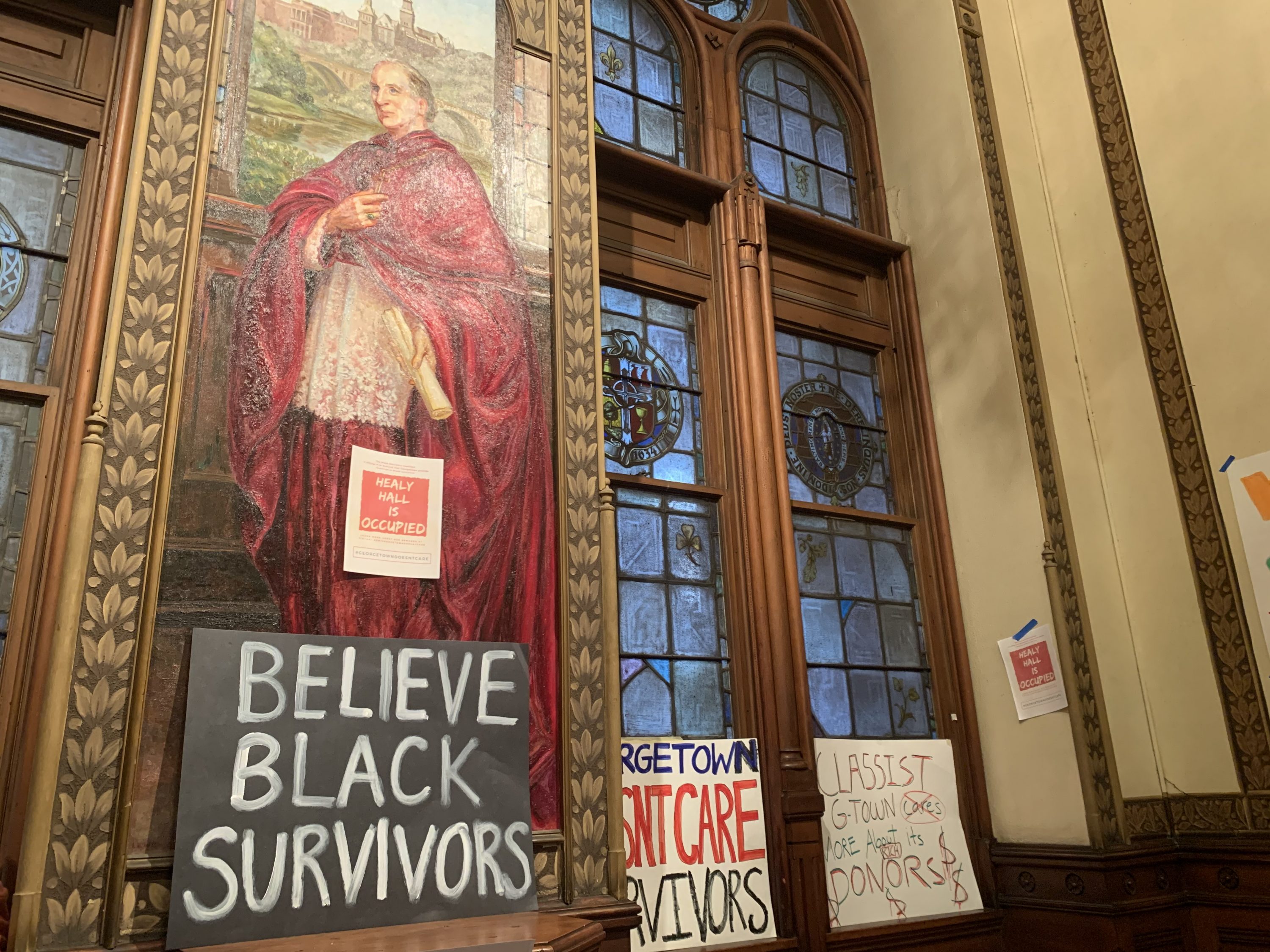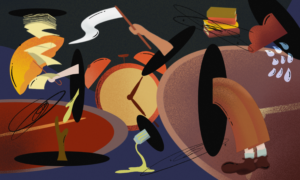Content Warning: This article discusses sexual assault
Update 8:51 pm: Rosemary Kilkenny, vice president of institutional diversity and equity, released an email on behalf of the administration, affirming its commitment to address all 10 of the Black Survivors Coalition’s demands. Kilkenny recognized the work of the protesters, saying, “we see these commitments as the start of our work, rather than its completion,”and laid out plans to meet the demands.
These plans include previously announced commitments, as well as a new online suite of supplemental courses for RESPECT training designed to prevent discrimination, harassment, and sexual misconduct, and committing to providing students with quarterly updates on our work relating to Title IX, sexual violence and the campus climate.
In addition, the university has pledged additional funds for the SAPE program, and a minimum of $15,000 dedicated to the off-campus mental health stipend while it works to secure donor support.
The Black Survivors Coalition has not yet responded the university’s email. The sit-in will continue tomorrow.
Original Post 7:48 pm: An ongoing sit-in by the Black Survivors Coalition continued on Feb. 25 and 26. The sit-in comes after a letter, titled #GeorgetownDoesntCare, was delivered to University President John DeGioia’s office on Feb. 21 with a list of ten demands to improve sexual assault resources for black, femme, and non-binary identifying survivors of sexual assault.
On the second day of the sit-in, student protesters met with Georgetown College Dean Christopher Celenza, Phil Meilman, director of Counseling and Psychiatric Services (CAPS), Chief of Georgetown University Police Department Jay Gruber, and Vice President for Public Affairs Erik Smulson.
The meeting with Celenza focused on the development of a Women and Gender Studies Department (WGST). This was listed as one of the coalition’s demands and follows several previous attempts to create the department.
The students discussed the hiring of tenured professors for a WGST department. “We were talking about how the Woman and Gender Studies program needs to be more established. It is not even a department,” Makayla Jeffries (COL ’23), a member of the coalition, said.
Celenza bemoaned the lack of faculty that restricted the WGST program from becoming a department but stressed that work is being done. “Professor LaMonda Horton-Stallings of the [African American Studies] Department has been leading the search. We developed a list of folks with books and research with Professor You-Me Park. It is unthinkable right now to make a program with not enough tenure faculty into a department,” Celenza said.
Students pointed out that Park is one of only two tenured faculty in the program and is also expected to advise theses and run the department. Students asked how she can be expected to find tenured professors in addition to her other work. “That is her choice. She is a very giving person,” Celenza said.
When Celenza asked students to trust him, upperclassmen students brought up that they have been petitioning for the development of the Women and Gender Studies program for years.
“None of us trust you,” Chad Gasman (COL ’20) said. “My sophomore year I made a proposal. I reached out to the exploratory committee. I refuse to trust you because you have made no written commitment for a timeline moving forward.”
Students asked to meet with Celenza again this week, but he refused, citing the tone of the students.
“I don’t think he was very responsive, and he seems to be threatened from strong personalities especially from a black woman,” Kayla Friedland (COL ’22) said. “He shut down. He stopped being willing to engage. He said he was not willing to set up another meeting because of a tone that I had.”
In a statement to the Voice, Celenza reaffirmed his commitment to creating the Women’s and Gender Studies program. “I appreciated hearing the perspectives of the students,” Celenza wrote. “We are finishing our search for a new tenured faculty leader. Once a new director is in place, we will be in a position to explore ways to maximize the reach of the program.”
Students expressed frustration with non-answers from the administration. They disliked being asked to trust administrators who have not responded to demands for resources in previous years.
“I am just frustrated that even before this list of demands, this has been an ask for years now. We have been asking for timelines and momentum for years, and to be told that they are committed to it now, when they have not shown any reason to believe that is particularly upsetting,” Gasman said.
When members of the sit-in met with Meilman, he apologized to students for the limitations of CAPS and agreed that resources needed to be expanded, especially for marginalized students in the Georgetown community. Members of the coalition took the chance to lead the meeting and express their concerns about CAPS.
Students considered this meeting to be the most productive thus far, as the discussion centered on hiring and training more clinicians of color for CAPS services. “I feel though at times contentious, a lot of the conversations that we have had are net positives, in that we were able to articulate very specific asks, not even asks, but demands of the university, and insight into the institutional failures,” Nile Blass (COL ’22).
While some conversations have led to more in depth timelines than others, coalition members are optimistic that the sit-in is causing change. “A lot of the promises, not promises because they are wishy washy, but commitments with deadlines that we have received from administrators have been really good, like the continuation of mental health funding for off-campus therapy,” Blass said.
“Not everything has been great. Not every response has been positive, but we are hopeful.”
The final meeting of the second day included GUPD Chief of Police Jay Gruber and Vice President of Public Affairs Erik Smulson. The administration began by apologizing for GUPD’s failure to make students feel comfortable on campus. “It is not easy being a person of color in America today. It is not easy being a person of color on a majority-white campus. I appreciate that, and I apologize for the pain you are going through,” Smulson said.
Students expressed concerns over bias within GUPD. “I do not like having to be stopped in my own office, in the GUSA office, questioned and asked for my GoCard about why I am even there,” said Norman Francis Jr. (COL ’20) outgoing GUSA president. “I do not like having to be stopped on O Street, I do not like having to be stopped on any of the streets on campus and questioned about what I am doing here, what I am doing here in this neighborhood in the first place.”
The conversation also focused on GUPD’s oversight and methods of reporting bias and assault. Students pointed out that, in their experience, current methods of reporting are not working. The students mentioned that reporting links seemingly do not work, and expressed frustration that they had not received responses after logging GUPD complaints. Coalition members called for a third party oversight committee for GUPD that includes students.
A few students in the sit-in shared their testimonies of police assault and stalking on-campus, naming specific GUPD officers. While students cited specific examples of police violence, Gruber claimed he had never received a report of violence regarding a GUPD officer.
“If you have to resign Chief Gruber, because you have failed to keep your officers in check, then so be it,” Gasman said.
A university spokesperson commented on the accusations of GUPD assault. “The University takes any report of misconduct or assault by a GUPD officer or any other member of the University Community very seriously and thoroughly investigates and responds in each case,” they wrote.
“While, we cannot comment on any individual cases, any officer or other University employee found responsible for a violation of University policy could face discipline up to and including dismissal.”
Students asked about the long wait times for Saferides and the use of police cars in the Saferides systems. Coalition members expressed concerns that students do not feel safe with hour-long wait times or rides in the back of a police car.
Gruber addressed the fact that one of the three Saferides vans was broken down, but would be fixed by Monday. Students in the meeting pointed out that this fixed van would still only improve resources to the bare minimum. Prior to the meeting, students were unaware that a van had even broken down and called for increased transparency.
An update from Smulson on Feb. 26 said that he had identified the days of greatest demand for Saferides and was redistributing resources accordingly. Smulson also provided papers with more detailed information on GUPD officer training.
A fourth van will be added on Monday, Wednesday, and Fridays by Mar. 16. All Saferide drivers will be SAPE trained by the end of March.
Classes including one taught by Professor Amanda Phillips, have joined the protesters throughout the day and discussed the sit-in.
The sit-in is ongoing and will continue until students feel the university has adequately responded to the coalition’s demands.
This story has been updated to change the name of the professor who brought their class
This story is ongoing and will continue to be updated
Darren Jian contributed to this report
Image credits: Sarah Watson



